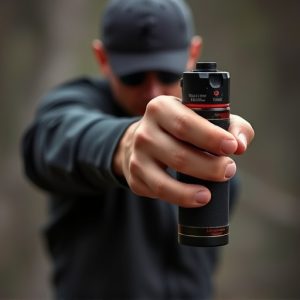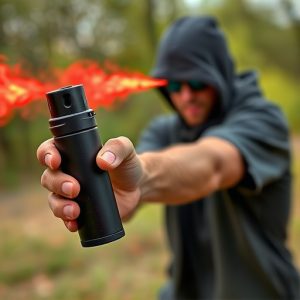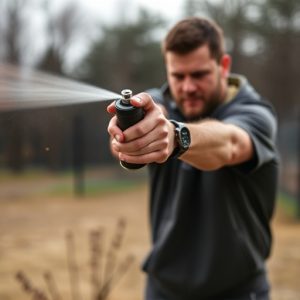Environmental Factors and Safe Use of Pepper Spray for Civil Protection
Environmental conditions significantly affect the performance of pepper spray, with high humidity re…….
Environmental conditions significantly affect the performance of pepper spray, with high humidity reducing potency, extreme temperatures impacting evaporation rates, and wind patterns influencing dispersion. For optimal protection, users should consider these factors, inspect spray integrity before use, maintain proper storage, and undergo regular training to ensure maximum effectiveness and control in diverse outdoor scenarios.
“Uncovering the Power of Inflammatory Sprays for Civilian Safety: A Comprehensive Guide. This article delves into the world of pepper spray, exploring its efficacy as a civilian protection tool. We examine the active ingredients responsible for its potency against inflammatory conditions, while also considering the subtle yet significant influence of environmental factors on performance. Additionally, best practices for selection and usage are highlighted to ensure safety and effectiveness in various scenarios.”
- Understanding Pepper Spray: Active Ingredients and Their Efficacy Against Inflammatory Conditions
- Environmental Considerations: How Outdoor Factors Impact the Performance of Pepper Spray for Civilian Protection
- Safety and Effectiveness: Best Practices for Choosing and Using Pepper Spray in Civil Protection Scenarios
Understanding Pepper Spray: Active Ingredients and Their Efficacy Against Inflammatory Conditions
Pepper spray, a popular self-defense tool for civilians, is designed to incapacitate an assailant temporarily through the irritation of the eyes and respiratory tract. The primary active ingredient in pepper spray is capsaicin, derived from chili peppers. Capsaicin is known for its inflammatory properties, which cause a burning sensation when it comes into contact with mucous membranes.
The efficacy of pepper spray against inflammatory conditions can be influenced by various environmental factors. For instance, high humidity levels can reduce the spray’s effectiveness as water dilutes the capsaicin and slows down its evaporation. Conversely, dry or windy conditions can enhance the spray’s impact since these environments expedite the dispersion of capsaicin particles, increasing their concentration in the target area. Understanding how environmental conditions affect pepper spray is crucial for optimal self-defense and ensuring its reliability under different circumstances.
Environmental Considerations: How Outdoor Factors Impact the Performance of Pepper Spray for Civilian Protection
The effectiveness of pepper spray in civilian protection can be significantly influenced by various environmental conditions. Outdoor factors such as temperature, humidity, and wind play a crucial role in how pepper spray performs during real-world scenarios. For instance, extreme heat or cold temperatures can cause pepper spray to evaporate more quickly, reducing its potency and range. High humidity levels may also impact the spray’s dispersion and intensity, making it less effective against close-range threats.
Wind patterns are another critical consideration; strong gusts can carry pepper spray away from the intended target, reducing its impact. In contrast, calm conditions allow for better control and accuracy when deploying the spray. Understanding these environmental considerations is essential for law enforcement and civilians alike to ensure optimal protection and maximize the effectiveness of pepper spray under different outdoor situations.
Safety and Effectiveness: Best Practices for Choosing and Using Pepper Spray in Civil Protection Scenarios
When choosing and using pepper spray for civilian protection, understanding safety and effectiveness is paramount. It’s crucial to consider how environmental conditions can affect its performance. Rain or high humidity can reduce the spray’s range and potency, as water dilutes the capsaicin, while wind can cause the spray to drift away from the target, rendering it less effective. Always inspect the spray before use; check expiration dates, ensure the safety seal is intact, and familiarize yourself with the instructions.
Best practices dictate that users should aim for facial areas like eyes, nose, and mouth, maintaining a safe distance of 2-3 meters to minimize cross-contamination and maximize impact. Regular training is essential to develop proper application techniques and build confidence in its use. Storing pepper spray in a cool, dry place, out of reach of children or unauthorized individuals, is also vital to maintain its integrity.
The effectiveness of pepper spray as a civilian protection tool is significantly influenced by environmental conditions, as discussed. Understanding the active ingredients and their interactions with various outdoor factors is crucial for optimal performance. By adhering to best practices for selection and usage, individuals can ensure the safety and efficacy of pepper spray in different scenarios. When considering the potential risks and benefits, it’s clear that proper training and knowledge are essential for responsible use in civil protection situations.


